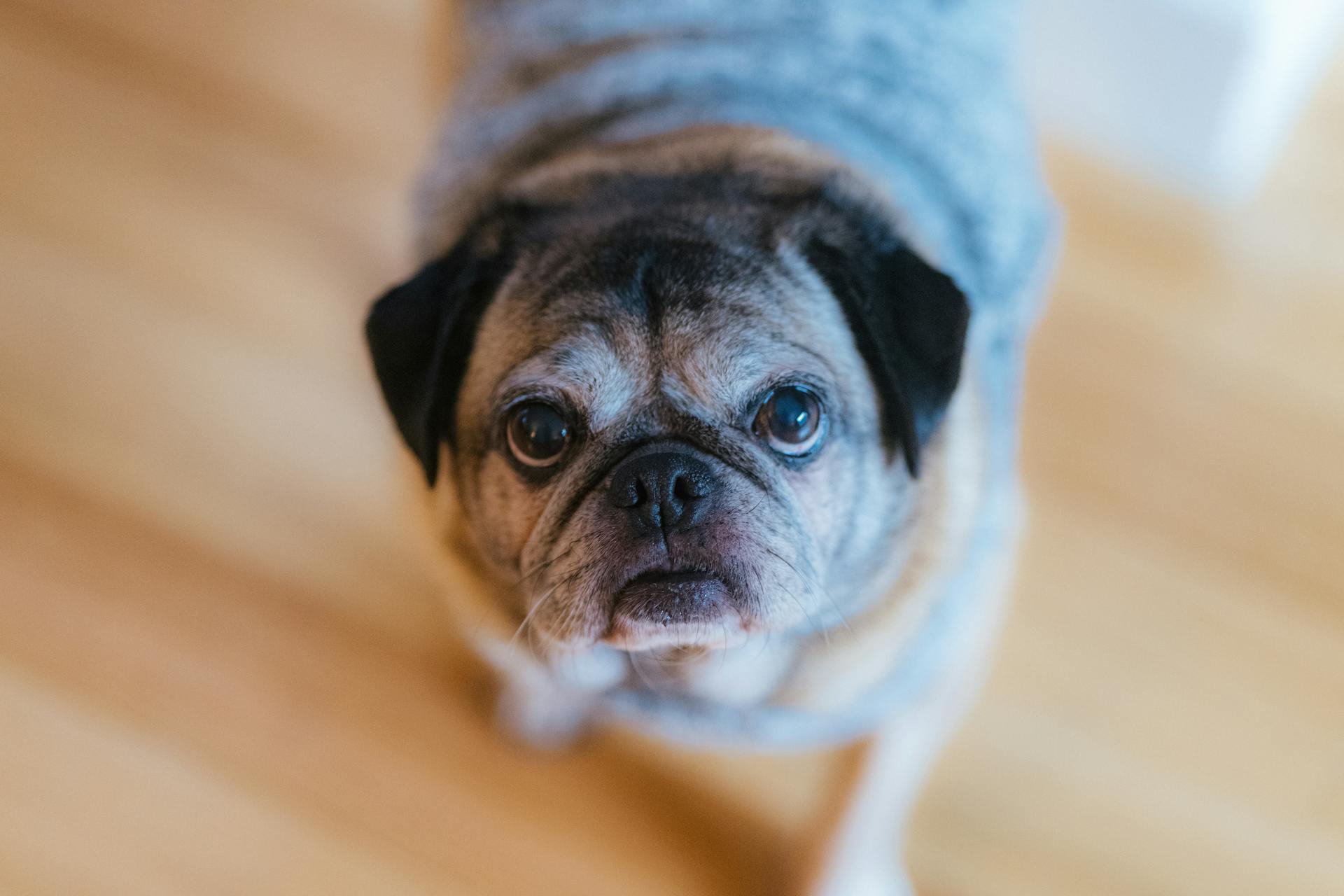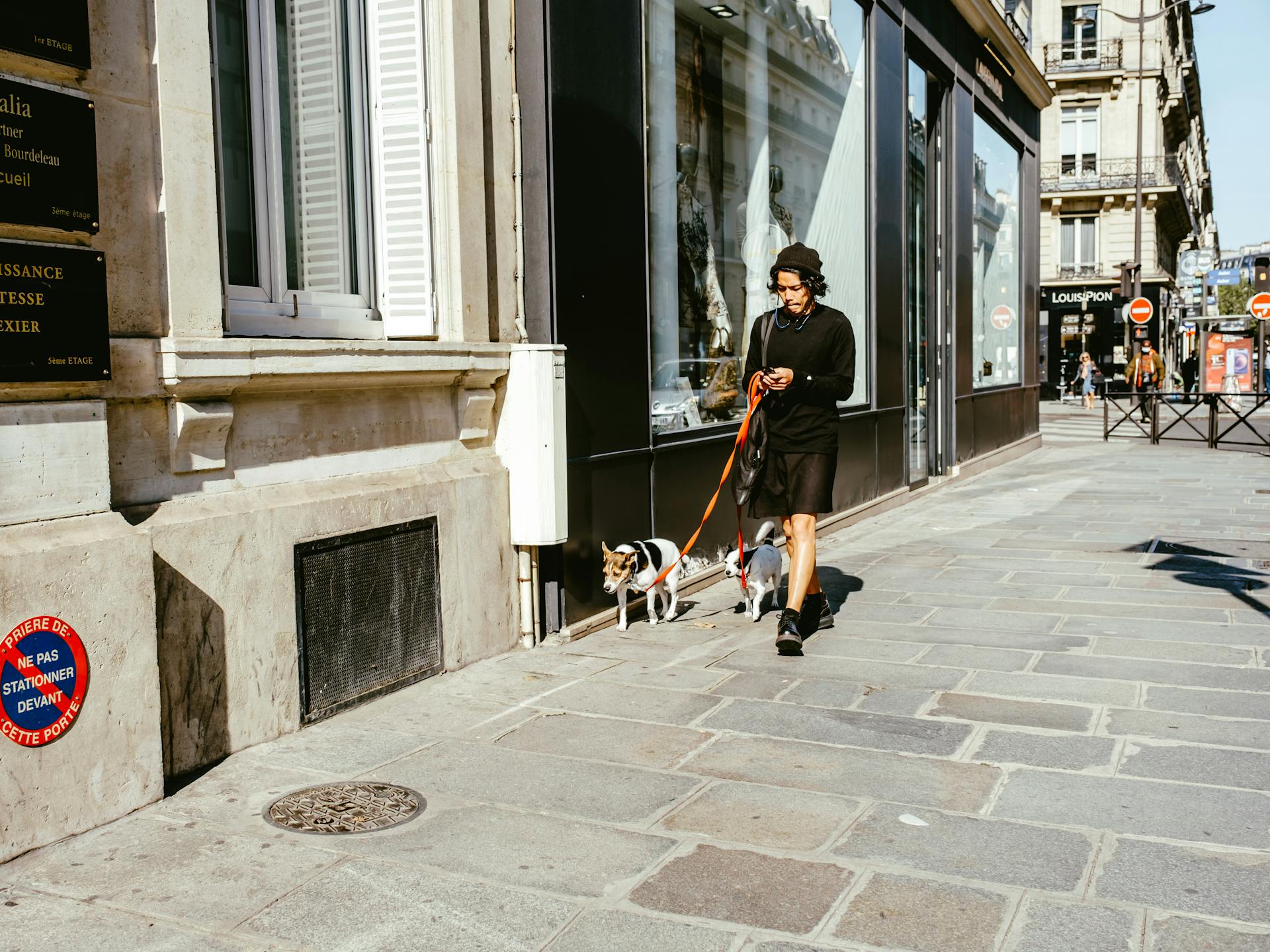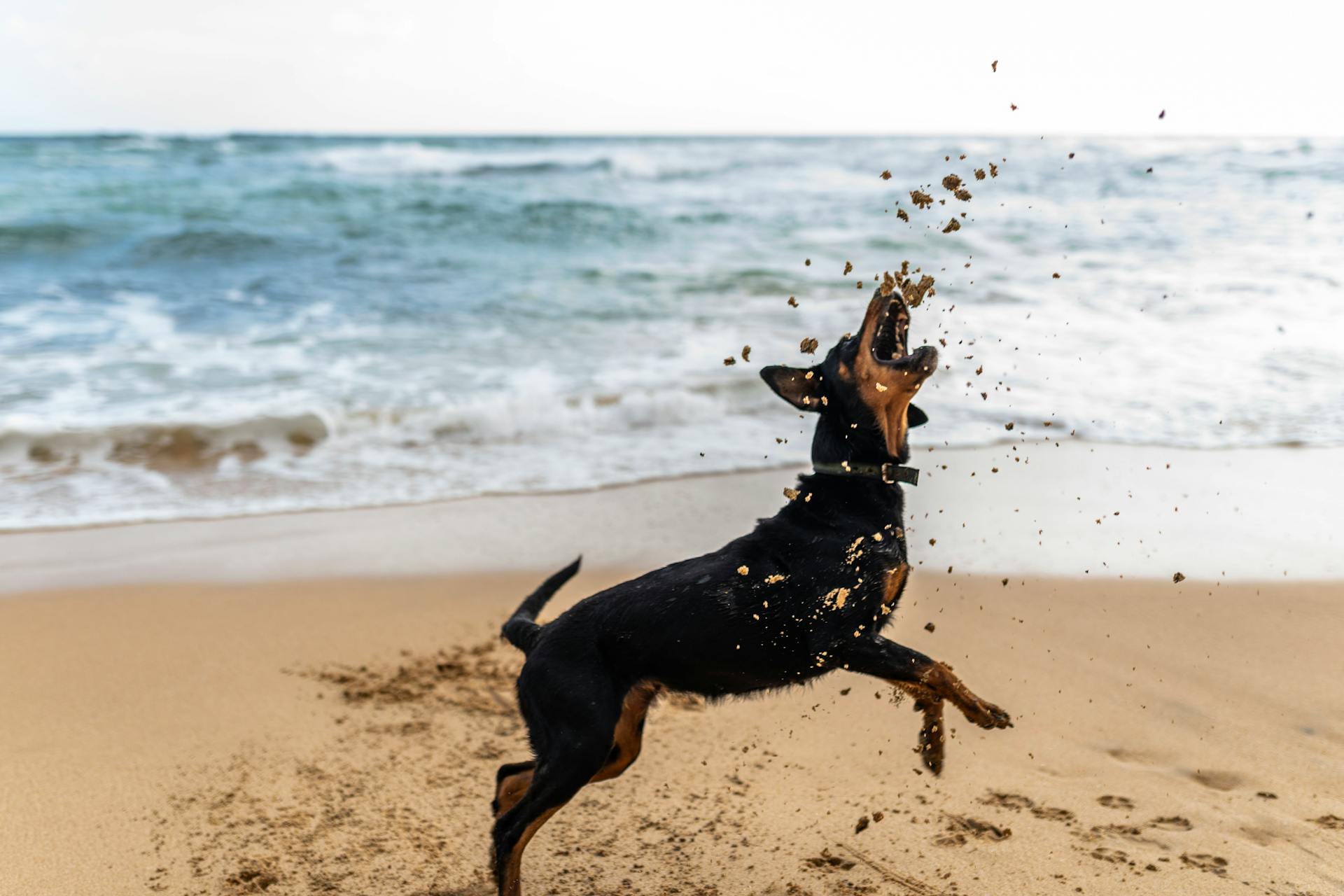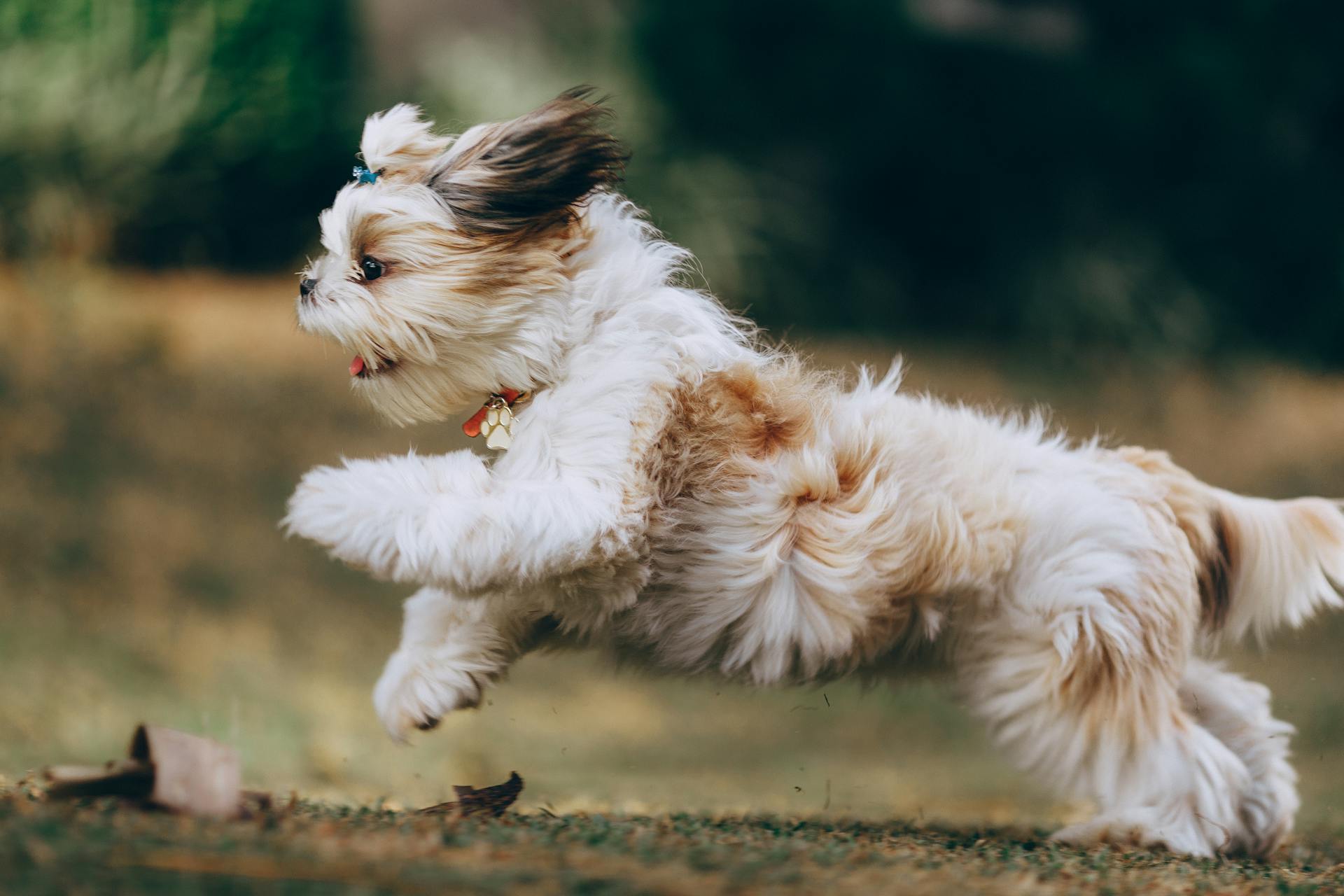
If your Shih Tzu is panting excessively, it's essential to identify the underlying cause to ensure they receive the proper care. One possible reason is that they're experiencing heat stress, especially during warm weather, as their thick coat can make them more susceptible to overheating.
Their short snout and flat face can also contribute to breathing difficulties, making it harder for them to regulate their body temperature. This can lead to panting as a way to cool down.
Shih Tzus are prone to obesity, and excess weight can exacerbate breathing problems, causing them to pant more frequently. Regular exercise and a balanced diet can help maintain a healthy weight.
As a responsible dog owner, keeping an eye on your Shih Tzu's overall health and watching for any signs of distress can help prevent panting episodes.
If this caught your attention, see: Shih Tzu Breathing Fast
Causes of Panting
Your Shih Tzu is panting, and you're worried. Panting is a natural occurrence in dogs, but it can also be a sign of an underlying issue. A normal dog may pant when it's hot, excited, anxious, or tired after exercise.
Some common causes of panting in dogs include heatstroke, heart or lung disease, Cushing's disease, pain, or anxiety. These causes can have distinct triggers, from hot weather to physical discomfort or stress.
Dogs like Shih Tzus, with their short snouts, are prone to heavier breathing than other dogs. This can be normal, but it's also a sign a dog may be suffering from heatstroke or has consumed a toxic substance.
Dogs take between ten and thirty breaths a minute, depending on their size. Get to know what your dog's everyday breathing and panting looks like so you'll more quickly notice suspicious changes.
Here are some possible causes of panting in dogs:
- Heatstroke or poisoning
- Chronic illness, such as heart failure, Cushing's syndrome, or respiratory disorders
- Injury and pain
- Medication, such as prednisone
If you can't find any obvious reason for a sudden change in your dog's breathing, take them to a veterinarian immediately. If you suspect heatstroke, follow the steps to help cool your dog safely.
Expand your knowledge: Shih Tzu Dog
Medical Conditions
Medical conditions can cause panting in Shih Tzus, and it's essential to identify the underlying issue to provide proper care. A disease process can affect your Shih Tzu, such as tracheal collapse or lung conditions like pneumonia.
Some lung conditions may also cause your dog to struggle with exercise, leading to panting. These conditions can include pneumonia, severe inflammation, lungworm, and certain cancers. You might notice your dog's tongue and gums don't look so pink, and they might be coughing and breathing faster than normal.
Pain is another common cause of panting in Shih Tzus, and it can be caused by various issues, such as arthritis, cystitis, back pain, or toothache.
Heatstroke
Heatstroke is life-threatening and affects more dogs than you might think. It can even occur on warm days, not just hot ones.
Dogs can only lose heat by panting and via small amounts of sweat from their paws, and both methods are inefficient. This makes them prone to heatstroke, especially if they're exerting themselves.
Walking your dog at dusk or dawn on warm days can help prevent heatstroke. This is because the temperatures are generally lower during these times.
Even a short walk can cause heatstroke if your dog doesn't have access to shade and water to cool off. It's better to skip a walk altogether if it feels too warm.
Once a dog's temperature gets too high, they risk seizures, brain damage, organ failure, and even death.
Cushing's Disease
Cushing's disease is a common condition in senior dogs, and excessive panting is one of its hallmark symptoms. It's caused by an overproduction of cortisol in the bloodstream.
Too much cortisol can be triggered by a tumor on the pituitary gland or adrenal glands, or even by long-term use of oral steroids like prednisone.
The most common clinical signs of Cushing's disease include excessive panting, increased thirst and urination, increased appetite, and a pot-bellied appearance. These symptoms are often accompanied by abnormalities in routine blood and urine testing.
A definitive diagnosis of Cushing's disease can be made with special blood tests, such as a low-dose dexamethasone suppression test (LDDST) or an ACTH stimulation test.
Pain
Pain is a common cause of panting in dogs, so if your Shih Tzu is panting more than usual, it could be a sign that they're painful.
Panting is often the first sign of pain in dogs, even before they show other signs of distress.
A recent trauma is an obvious cause of pain, but other causes like arthritis, cystitis, back pain, or toothache might not be so apparent.
If your Shih Tzu is panting and everything else seems to be in order, check to see if they're hurt or injured.
A different take: Shih Tzu Scratching All the Time
Discolored Gums
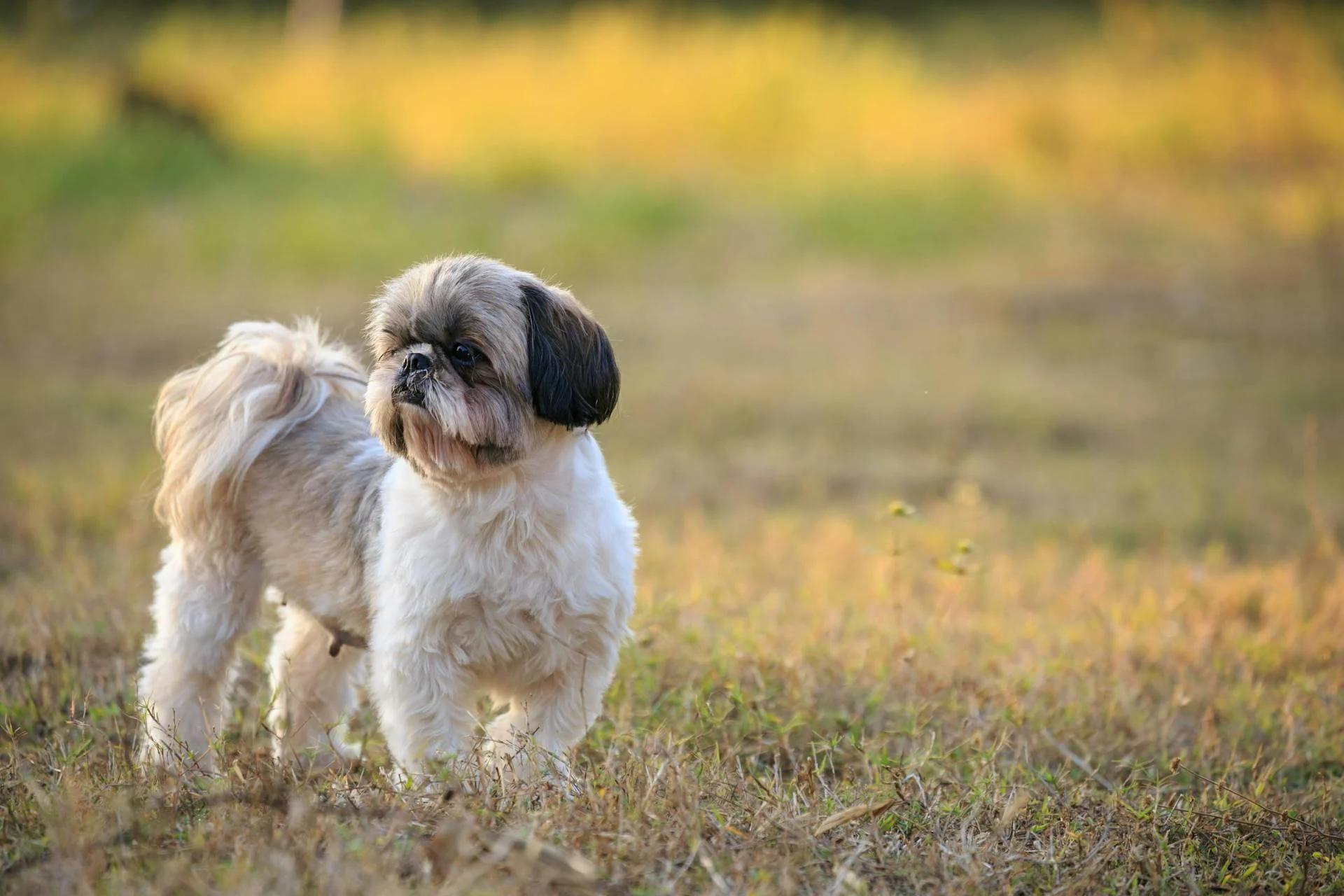
Discolored gums are a concerning sign in Shih Tzus, often caused by a lack of oxygen in their blood.
This discoloration can manifest as blue, purple, or white, and is a clear indication that your Shih Tzu is panting excessively due to a medical issue.
Their gums might look normal at first, but as the condition worsens, the discoloration will become more noticeable.
A lack of oxygen in the blood can be caused by various factors, including respiratory problems or cardiac issues.
If you notice your Shih Tzu's gums are discolored, it's essential to consult with a veterinarian to determine the underlying cause and receive proper treatment.
Behavioral Issues
Your Shih Tzu panting could be a sign of anxiety and fear overwhelming them, causing them to pace around the room and whine excessively.
Dogs with separation anxiety may experience hyperventilation and rapid breathing as you prepare to leave the house.
Panting can also be a response to pain, emotional stress, and anxiety, making your Shih Tzu uncomfortable and stressed out.
If your dog's hyperventilating is associated with stress or pain, try to make them as comfortable as possible by removing them from stressful situations.
Dogs with anxiety may exhibit symptoms like panting, pacing, barking, whining, and even damaging furniture by scratching or chewing.
Temporary anxiety in dogs is usually not a cause for concern, but severe anxiety and stress can be distressing for both you and your Shih Tzu.
If your Shih Tzu is panting due to anxiety, try using calming treats containing ingredients like hemp and chamomile to help soothe them.
Your vet can also help you identify the cause of your Shih Tzu's anxiety and recommend the best course of action to help them feel more comfortable.
8. Medication Side Effects
Medication side effects can be a common reason for panting in Shih Tzus.
Prednisone, a steroid given to dogs with immunity issues or skin allergies, can cause panting in Shih Tzus.
Speak with your veterinarian if your Shih Tzu is on medications of any type and panting more often than usual.
Prednisolone and other steroids can also cause panting in Shih Tzus, making it essential to monitor your dog's behavior and consult with your vet if necessary.
Your veterinarian can help you identify and address any medication-related panting issues with your Shih Tzu.
Symptoms and Signs
Your Shih Tzu's panting can be a sign of something more serious than just being hot or tired. Rapid breathing, heavy breathing, or open-mouth breathing are all signs of hyperventilation in dogs.
Dogs with hyperventilation may also exhibit rapid heart rate, blue gums, and excessive panting and drooling. Excessive salivation is another sign to look out for, especially if it's accompanied by panting.
Here are some common symptoms of excessive panting in dogs:
- Rapid or shallow breathing
- Open-mouthed breathing
- Excessive salivation
- Restlessness or anxiety
- Lethargy or weakness
- Changes in gum color
- Coughing or wheezing
- Increased thirst
- Loss of appetite
- Behavioral changes
- Physical discomfort
A raspy or wheezy panting sound can also be a sign of an underlying issue, so it's essential to pay attention to your Shih Tzu's breathing patterns and consult a vet if you notice any unusual sounds.
Your Sounds Raspy
If your Shih Tzu's panting sounds raspy, it's a sign their panting is abnormal. This is a clear indication that something is amiss.
Panting usually sounds like quick breathing, but if it sounds like someone using sandpaper, that's a red flag.
Signs of Excessive
As you observe your dog's behavior, it's essential to recognize the signs of excessive panting. A dog's panting can be a normal response to heat, exercise, or excitement, but excessive panting can be a sign of a more serious issue.
Excessive panting can manifest in various ways, including rapid breathing, shallow breathing, or open-mouth breathing. If you notice any of these symptoms, it's crucial to consult a vet.
Some common signs of excessive panting include excessive salivation, restlessness or anxiety, lethargy or weakness, and changes in gum color. If you see any of these signs, it's time to take a closer look.
Here are some specific signs to watch out for:
- Rapid breathing, heavy breathing, or open-mouth breathing
- Rapid heart rate
- Blue gums
- Excessive panting and drooling
- Weakness or dizziness
- Collapse or fainting
- Snorting or wheezing
- Rabid or shallow breathing
- Excessive salivation
- Restlessness or anxiety
- Lethargy or weakness
- Changes in gum color
- Coughing or wheezing
- Increased thirst
- Loss of appetite
- Behavioral changes
- Physical discomfort
Keep in mind that each dog is different, and what's normal for one dog may not be normal for another. The most important thing is to know what's normal for your dog and to seek veterinary attention if you notice any changes in their behavior or physical condition.
Prevention and Treatment
If your Shih Tzu is panting heavily, it's essential to take action to prevent further complications. Consult with a licensed veterinary medicine professional (DVM) at the first signs of breathing difficulties.
To prevent hyperventilating in your Shih Tzu, avoid triggers like stress, anxiety, and allergies. If your dog suffers from anxiety, consider giving them soothing treats like Calming Hemp Chews. For allergies, try AllergyImmunity Chews, which contain probiotics and other ingredients that may help support digestion and immune health.
Dogs who are prone to heavier breathing, such as Shih Tzus with short snouts, may be at risk for heatstroke or poisoning. If you suspect heatstroke, follow the steps to help cool your dog safely. Monitor your Shih Tzu's breathing and panting patterns to quickly notice suspicious changes.
Common causes of heavy panting in dogs include heatstroke, chronic illness, injury and pain, and medication. Some medications, such as prednisone, may lead to heavy panting in dogs.
For another approach, see: Do Shih Tzus Have Breathing Problems
Treatment of Hyperventilation
If your dog's rapid, shallow breathing is due to excitement, you can try removing them from the environment causing the overexcitement and monitoring them closely. If symptoms subside quickly, you can skip a trip to the vet.
In most other cases, it's a good idea to take your pet to the veterinarian if they show signs of hyperventilation. A vet can help identify breathing problems caused by medical conditions and recommend proper treatment protocols.
Depending on the cause of the hyperventilating, the vet may try to cool down your dog's body temperature or reduce anxiety and excitement by using a sedative. They may use a combination of bronchodilators and antihistamines if allergies are behind the breathing troubles.
Here are some common causes of hyperventilation and their corresponding treatments:
If you suspect your dog has heatstroke, it's essential to act quickly and follow the steps to help cool them safely. In all cases, if your dog's symptoms don't subside quickly, seek medical attention to rule out other underlying contributors.
Talk with Your Vet
Don't hesitate to reach out to your vet if your senior dog is panting and restless. Unless it's transient and occasional, this behavior is not normal and needs to be addressed.
Your veterinarian is an integral part of your dog's healthcare team and can help unravel the mystery of why your dog is panting and restless.
If your dog is having trouble breathing, seek veterinary care immediately.
Gastric dilatation and volvulus, also known as bloat, is a life-threatening emergency that often presents with panting and restlessness.
Heatstroke: Emergency Response
If you suspect your Shih Tzu is experiencing heatstroke, emergency response is crucial to prevent brain damage or even death.
Call your veterinarian or a pet poison hotline immediately for guidance.
Your Shih Tzu's temperature can rise rapidly, reaching 106°F (41.1°C) or higher in just a few minutes.
The sooner you seek veterinary attention, the better the chances of recovery.
Administer cool water slowly and carefully to avoid shocking your Shih Tzu's system.
A rectal thermometer is the most accurate way to check your Shih Tzu's temperature.
You should aim to get your Shih Tzu to a veterinarian within 30 minutes of the onset of heatstroke symptoms.
A cool, well-ventilated area can help lower your Shih Tzu's body temperature before seeking veterinary care.
Keep your Shih Tzu away from direct sunlight and heat sources.
Sources
- https://www.hepper.com/why-is-my-shih-tzu-panting/
- https://www.pethonesty.com/blogs/blog/dog-hyperventilating
- https://bettervet.com/resources/pet-symptoms/common-reasons-for-excessive-dog-panting-and-when-to-worry
- https://toegrips.com/why-is-my-dog-panting-and-restless/
- https://www.webmd.com/pets/dogs/dog-panting-heavily
Featured Images: pexels.com
